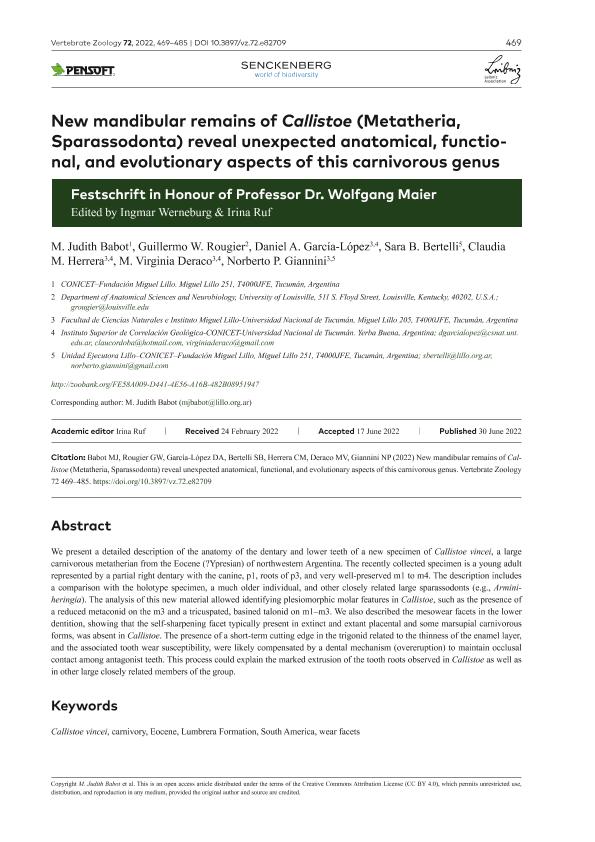Mostrar el registro sencillo del ítem
dc.contributor.author
Babot, María Judith

dc.contributor.author
Rougier, Guillermo Walter

dc.contributor.author
Garcia Lopez, Daniel Alfredo

dc.contributor.author
Bertelli, Sara Beatriz

dc.contributor.author
Herrera, Claudia Marcela Reina

dc.contributor.author
Deraco, Maria Virginia

dc.contributor.author
Giannini, Norberto Pedro

dc.date.available
2023-08-07T09:50:58Z
dc.date.issued
2022-06
dc.identifier.citation
Babot, María Judith; Rougier, Guillermo Walter; Garcia Lopez, Daniel Alfredo; Bertelli, Sara Beatriz; Herrera, Claudia Marcela Reina; et al.; New mandibular remains of Callistoe (Metatheria, Sparassodonta) reveal unexpected anatomical, functional, and evolutionary aspects of this carnivorous genus; Pensoft Publishers; Vertebrate Zoology; 72; 6-2022; 469-485
dc.identifier.issn
1864-5755
dc.identifier.uri
http://hdl.handle.net/11336/207079
dc.description.abstract
We present a detailed description of the anatomy of the dentary and lower teeth of a new specimen of Callistoe vincei, a large carnivorous metatherian from the Eocene (?Ypresian) of northwestern Argentina. The recently collected specimen is a young adult represented by a partial right dentary with the canine, p1, roots of p3, and very well-preserved m1 to m4. The description includes a comparison with the holotype specimen, a much older individual, and other closely related large sparassodonts (e.g., Arminiheringia). The analysis of this new material allowed identifying plesiomorphic molar features in Callistoe, such as the presence of a reduced metaconid on the m3 and a tricuspated, basined talonid on m1–m3. We also described the mesowear facets in the lower dentition, showing that the self-sharpening facet typically present in extinct and extant placental and some marsupial carnivorous forms, was absent in Callistoe. The presence of a short-term cutting edge in the trigonid related to the thinness of the enamel layer, and the associated tooth wear susceptibility, were likely compensated by a dental mechanism (overeruption) to maintain occlusal contact among antagonist teeth. This process could explain the marked extrusion of the tooth roots observed in Callistoe as well as in other large closely related members of the group.
dc.format
application/pdf
dc.language.iso
eng
dc.publisher
Pensoft Publishers

dc.rights
info:eu-repo/semantics/openAccess
dc.rights.uri
https://creativecommons.org/licenses/by-nc-sa/2.5/ar/
dc.subject
CALLISTOE VINCEI
dc.subject
CARNIVORY
dc.subject
EOCENE
dc.subject
LUMBRERA FORMATION
dc.subject.classification
Paleontología

dc.subject.classification
Ciencias de la Tierra y relacionadas con el Medio Ambiente

dc.subject.classification
CIENCIAS NATURALES Y EXACTAS

dc.title
New mandibular remains of Callistoe (Metatheria, Sparassodonta) reveal unexpected anatomical, functional, and evolutionary aspects of this carnivorous genus
dc.type
info:eu-repo/semantics/article
dc.type
info:ar-repo/semantics/artículo
dc.type
info:eu-repo/semantics/publishedVersion
dc.date.updated
2023-06-16T12:40:41Z
dc.identifier.eissn
2625-8498
dc.journal.volume
72
dc.journal.pagination
469-485
dc.journal.pais
Alemania

dc.journal.ciudad
Stuttgart
dc.description.fil
Fil: Babot, María Judith. Consejo Nacional de Investigaciones Científicas y Técnicas; Argentina. Fundación Miguel Lillo; Argentina
dc.description.fil
Fil: Rougier, Guillermo Walter. University of Louisville; Estados Unidos
dc.description.fil
Fil: Garcia Lopez, Daniel Alfredo. Consejo Nacional de Investigaciones Científicas y Técnicas. Centro Científico Tecnológico Conicet - Tucumán. Instituto Superior de Correlación Geológica. Universidad Nacional de Tucumán. Facultad de Ciencias Naturales e Instituto Miguel Lillo. Departamento de Geología. Cátedra Geología Estructural. Instituto Superior de Correlación Geológica; Argentina. Universidad Nacional de Tucumán. Facultad de Ciencias Naturales e Instituto Miguel Lillo; Argentina
dc.description.fil
Fil: Bertelli, Sara Beatriz. Consejo Nacional de Investigaciones Científicas y Técnicas. Centro Científico Tecnológico - Tucumán. Unidad Ejecutora Lillo; Argentina
dc.description.fil
Fil: Herrera, Claudia Marcela Reina. Consejo Nacional de Investigaciones Científicas y Técnicas. Centro Científico Tecnológico Conicet - Tucumán. Instituto Superior de Correlación Geológica. Universidad Nacional de Tucumán. Facultad de Ciencias Naturales e Instituto Miguel Lillo. Departamento de Geología. Cátedra Geología Estructural. Instituto Superior de Correlación Geológica; Argentina. Universidad Nacional de Tucumán. Facultad de Ciencias Naturales e Instituto Miguel Lillo; Argentina
dc.description.fil
Fil: Deraco, Maria Virginia. Consejo Nacional de Investigaciones Científicas y Técnicas. Centro Científico Tecnológico Conicet - Tucumán. Instituto Superior de Correlación Geológica. Universidad Nacional de Tucumán. Facultad de Ciencias Naturales e Instituto Miguel Lillo. Departamento de Geología. Cátedra Geología Estructural. Instituto Superior de Correlación Geológica; Argentina
dc.description.fil
Fil: Giannini, Norberto Pedro. Consejo Nacional de Investigaciones Científicas y Técnicas. Centro Científico Tecnológico - Tucumán. Unidad Ejecutora Lillo; Argentina
dc.journal.title
Vertebrate Zoology
dc.relation.alternativeid
info:eu-repo/semantics/altIdentifier/url/https://doi.org/10.3897/vz.72.e82709
dc.relation.alternativeid
info:eu-repo/semantics/altIdentifier/url/https://vertebrate-zoology.arphahub.com/article/82709/
Archivos asociados
